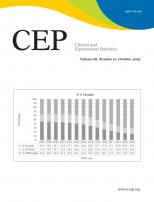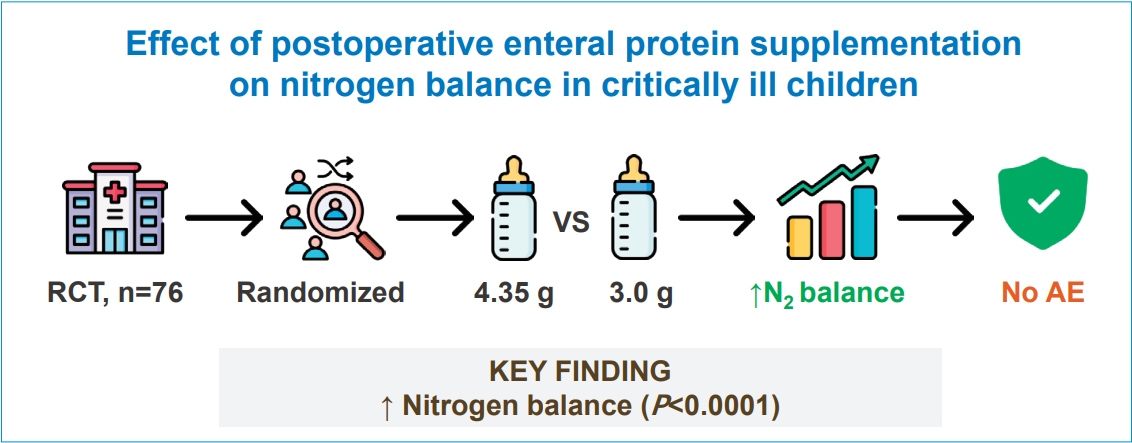2. Goday PS, Mehta NM. Metabolic alterations and nutrients in the critically ill child. In: Chwals WJ, editor. Pediatric critical care nutrition. New York: McGraw-Hill, 2015:3–13.
5. Yuniar I, Latief A, Devaera Y, Fitrianti S. Pemberian nutrisi pada pasien dengan penyakit kritis di ruang perawatan intensif anak RS. Cipto Mangunkusumo. Sari Pediatri 2014;16:254–9.


6. Nasar SS, Susanto J, Lestari ED, Djais J, Prawitasari T. Malnutrisi di rumah sakit. Damayanti RSBuku ajar nutrisi pediatrik dan penyakit metabolic. Jakarta: Badan Penerbit IDAI, 2011;:165–6.
8. Wong JJ, Han WM, Sultana R, Loh TF, Lee JH. Nutrition delivery affects outcomes in pediatric acute respiratory distress syndrome. JPEN 2017;41:1007–13.


10. Melro EC, de Souza Lima AE, Missagia de Mattos Springer A, de Souza TH, Negrão Nogueira RJ. Protein intake deficiency in critically ill children with respiratory insufficiency: a call to action? Clin Nutr ESPEN 2020;37:69–74.


12. Botrán M, López-Herce J, Mencía S, Urbano J, Solana MJ, García A. Enteral nutrition in the critically ill child: comparison of standard and protein-enriched diets. J Pediatr 2011;159:27–32.


13. de Betue CT, van Waardenburg DA, Deutz NE, van Eijk HM, van Goudoever JB, Luiking YC, et al. Increased protein-energy intake promotes anabolism in critically ill infants with viral bronchiolitis: a double-blind randomised controlled trial. Arch Dis Child 2011;98:817–22.
14. van Waardenburg DA, de Betue CT, Goudoever JB, Zimmermann LJ, Joosten KF. Critically ill infants benefit from early administration of protein and energy-enriched formula: a randomized controlled trial. Clin Nut 2009;28:249–55.

16. Zhang J, Cui Y, Luo Y, Chen X, Li J. Assessment of energy and protein requirements in relation to nitrogen kinetics, nutrition, and clinical outcomes in infants receiving early enteral nutrition following cardiopulmonary bypass. JPEN 2021;45:553–66.


17. Cui Y, Li L, Hu C, Shi H, Li J, Gupta RK, et al. Effects and tolerance of protein and energy-enriched formula in infants following congenital heart surgery: a randomized controlled trial. JPEN 2018;42:196–204.

18. Mehta NM, Skillman HE, Irving SY, Coss-Bu JA, Vermilyea S, Farrington EA, et al. Guidelines for the provision and assessment of nutrition support therapy in the pediatric critically ill patient: Society of Critical Care Medicine and American Society for Parenteral and Enteral Nutrition. JPEN 2017;41:706–42.


19. Fernández Montes R, Urbano Villaescusa J, Carrillo Álvarez Á, Vivanco Allende A, Solana García MJ, Díaz Coto S, et al. Effect of three enteral diets with different protein contents on protein metabolism in critically ill infants: a randomized controlled trial. Anales de Pediatría (Engl Ed) 2023;99:26–36.

20. Osland E, Yunus RM, Khan S, Memon MA. Early versus traditional postoperative feeding in patients undergoing resectional gastrointestinal surgery. JPEN 2011;35:473–87.


21. Hauschild DB, Oliveira LDA, Farias MS, Barbosa E, Bresolin NL, Mehta NM, et al. Enteral protein supplementation in critically ill children: a randomized controlled pilot and feasibility study. JPEN 2019;43:281–9.


22. Huang X, Zhou Y, Sun Y, Wang Q. Intestinal fatty acid binding protein: a rising therapeutic target in lipid metabolism. Prog Lipid Res 2022;87:101–78.

23. Yuki K, Matsunami E, Tazawa K, Wang W, DiNardo JA, Koutsogiannaki S. Pediatric perioperative stress responses and anesthesia. Transl Perioper Pain Med 2017;2:1–12.
25. Joosten KFM, Kerklaan D, Verbruggen SC. Nutritional support and the role of the stress response in critically ill children. Curr Opin Clin Nutr Metab Care 2016;19:226–33.


26. Verbruggen SC, Coss-Bu J, Wu M, Schierbeek H, Joosten KF, Dhar A, et al. Current recommended parenteral protein intakes do not support protein synthesis in critically ill septic, insulin-resistant adolescents with tight glucose control. Crit Care Med 2011;39:2518–25.


30. Ferrier D. Metabolisme nitrogen. In: Harvey RA, editor. Biokimia. 6th ed. Tangerang Selatan (Indonesia): Binarupa Aksara, 2014:9–74.
31. Reynolds RM, Bass KD, Thureen PJ. Achieving positive protein balance in the immediate postoperative period in neonates undergoing abdominal surgery. J Pediatr 2008;152:63–7.


32. Ong C, Han WM, Wong JJ, Lee JH. Nutrition biomarkas and clinical outcomes in critically ill children: a critical appraisal of the literature. Clin Nutr 2014;33:191–7.

33. Briassoulis G, Tsorva A, Zavras N, Hatzis T. Influence of an aggressive early enteral nutrition protocol on nitrogen balance in critically ill children. J Nutr Biochem 2002;13:560–9.


37. Xie H, Cai M, Zhang Y. Influence of early enteral nutrition plus probiotics on intestinal function of senile patients with sepsis. Am J Transl Res 2023;1:445–51.
38. Logan M, MacKinder M, Clark CM, Kountouri A, Jere M, Ijaz UZ, et al. Intestinal fatty acid binding protein is a disease biomarka in paediatric coeliac disease and Crohn’s disease. BMC Gastroenterol 2022;22:1–9.


40. Ministry of Health of the Republic of Indonesia. Decree of the Minister of Health of the Republic of Indonesia Number 779 of 2008 concerning Standards for Anesthesiology and Resuscitation Services in Hospitals [Keputusan Menteri Kesehatan Republik Indonesia Nomor 779 Tahun 2008 tentang Standar Pelayanan Anestesiologi dan Reanimasi di Rumah Sakit]. Jakarta: Ministry of Health of the Republic of Indonesia, 2008.
43. Hauschild DB, Ventura JC, Mehta NM, Moreno YM. Impact of the structure and dose of protein intake on clinical and metabolic outcomes in critically ill children: a systematic review. Nutrition 2017;41:97–106.


44. Chaloupecký V, Hučín B, Tláskal T, Kostelka M, Kuc̆ era V, Janoušek J, et al. Nitrogen balance, 3-methylhistidine excretion, and plasma amino acid profile in infants after cardiac operations for congenital heart defects: the effect of early nutritional support. J Thorac Cardiovasc Surg 1997;114:1053–60.


46. Behera BK, Misra S, Tripathy BB. Systematic review and meta-analysis of safety and efficacy of early enteral nutrition as an isolated component of Enhanced Recovery After Surgery [ERAS] in children after bowel anastomosis surgery. J Pediatr Surg 2022;7:1473–9.









 PDF Links
PDF Links PubReader
PubReader ePub Link
ePub Link PubMed
PubMed Download Citation
Download Citation


